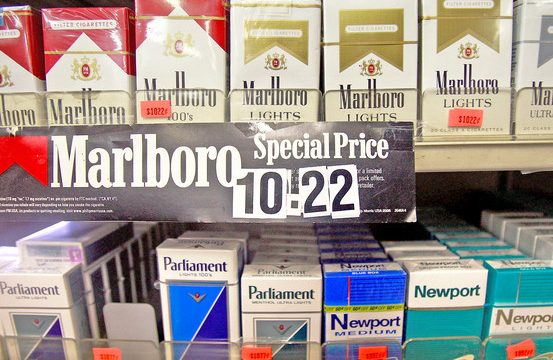A Tobacco Tax Hike More Likely To Inspire Smuggling Than Quitting

cigarettes tobacco
Grand Forks Rep. Eliot Glassheim has introduced a bill, HB1387, which would represent a massive 127% tax hike on cigarette sales. The excise tax would go from $0.44/pack to $1.00/pack.
Glassheim says that he expects the tax hike to raise $59 million in new revenue for the state, but that his goal isn’t so much revenue as getting people to quit smoking. “I hate to see people many of whom are addicted, suffer needlessly, have years cut off their lives, have families broken by heart disease, cancer and early death,” he’s told the media.
The problem is that his tax might not actually reduce smoking, or even raise that much revenue. Estimates from the North Dakota Policy Council and the Mackinac Center find that the tax hike is more likely to raise tobacco smuggling than anything else:
Cigarette smuggling has become rampant in parts of the country in large part due to tax-driven cost differentials between states. The Mackinac Center for Public Policy, a think tank out of Midland, Mich., has estimated cigarette smuggling rates for 47 of the 48 contiguous states. In some parts of the United States smuggling is rampant. New York’s estimated smuggling rate exceeds 60 percent of the total market.
According to the Mackinac Center’s recent report, in 2011 North Dakota was actually a net export state. That is, more cigarettes were taken out of North Dakota after purchase than were brought in. That will change should the new tax increase proposal become law. Smuggling into North Dakota will leap to almost 10 percent of total, in-state consumption. The figure would be higher but the Center report subtracts from its total any North Dakota cigarettes that are smuggled into Canada.
Legal paid sales would drop after such a hike and — as has happened elsewhere — politicians and people will be inclined to think that the decline is a function of quitting when it is actually more a function of smuggling and acquiring different tobacco products, such as pipe tobacco. The Mackinac Center estimates that North Dakota’s legal paid sales will drop by 4 million packs a year as a direct result of smuggling.
It’s worth noting that we have a real-world precedent for this. The Tax Foundation studied the impact of New York’s tax hikes on cigarettes ($5.85/pack) and found that as a result some 60% of the cigarettes in the state are smuggled in from lower-tax areas or bootlegged illegally to avoid taxes altogether.
North Dakota isn’t raising its taxes quite so dramatically, but even so it’s an illustration that this sort of policy really doesn’t work that well.







